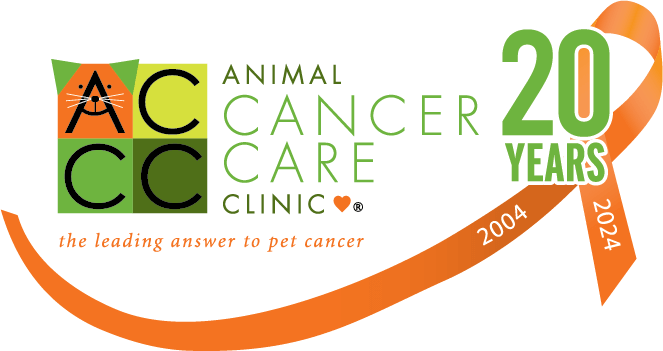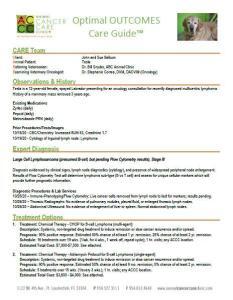Orlando/Melbourne: (407) 930-6679
Fort Lauderdale/all other locations: (954) 527-3111

HOPE starts with an ACCC Consultation
It is traumatic to learn that your beloved pet may have cancer, and yes, you will need to make some decisions. Your primary veterinarian trusts our medical, professional, and personal guidance and knows that making informed, responsible decisions about your pet’s well-being will give you peace of mind. With our expert care, you have reason to HOPE now more than ever before.
There are many new approaches to treating cancer in animals of any age, often at costs far less than expected. Because animals do not experience many of the negative side effects that humans do, the quality and longevity of an animal’s life can be significantly improved with even basic cancer care. Meeting with one of our Veterinary Medical Oncologists at a Consultation will help you learn about your pet’s condition and treatment options – often addressing preconceptions you may have about animal cancer care (e.g., too late, too expensive, too risky, too painful, too inconvenient).
Because animal cancer can advance quickly, we schedule Consultations with pet owners as soon as possible after your primary veterinarian suspects cancer. In most cases, your veterinarian will electronically submit your referral to ACCC while you are still at their clinic – with all information and any recent test results. You can also Schedule a Consultation yourself or simply call us directly.
A Consultation visit can be at any of our eight locations in Central and South Florida and will take about one to two hours during which a Veterinary Medical Oncologist will review your pet’s medical history, conduct an examination, and create what we call your Optimal OUTCOMES Care GuideTM. See below.
A Consultation with ACCC Provides Genuine HOPE
Hope
Every Consultation with ACCC includes a written Optimal OUTCOMES Care GuideTM created by the Medical Oncologist conducting your Consultation. The Guide includes an Expert Diagnosis and at least two Treatment Options with associated prognosis, costs and schedule. We will take the time to discuss and analyze the Treatment Comparisons with you, making sure to answer all your questions. Of course you are under no obligation to pursue any treatment whatsoever, but if you decide to go forward we can often initiate treatment at this first appointment. The Optimal OUTCOMES Care GuideTM will be sent to your primary veterinarian, who we will regularly update on your pet’s care and condition throughout any treatment.
Optimal OUTCOMES Care Guide™
1. Expert Diagnosis
The first step in our Consultation is procuring an Expert Diagnosis from the Medical Oncologist who will lead and coordinate your care at ACCC. Before cancer treatment options and related prognoses can be determined, a pet’s condition needs to be properly “diagnosed” and in many cases “staged” and/or “graded”. A diagnosis is the identification of the disease “type” including its location. The stage (stages 0-5) is a measurement of tumor size and/or spread in the body and the grade (grades 1-3) is a measurement of the abnormal appearance of cancer cells and possibility of malignancy.
We call it an Expert Diagnosis because it will always target the criteria only an expert Veterinary Medical Oncologist can meet consistently: that the diagnosis be as thorough and accurate as necessary to indicate the most effective Treatment Options, but not beyond what will impact those options – risking delay, expense and comfort unnecessarily. Because our Veterinary Medical Oncologists see a very high volume of cancer patients every day, they know best how to interpret symptoms, order and conduct exams, and understand lab findings – only pursuing further diagnostic tests when medically necessary.
Arriving at an ACCC Expert Diagnosis
- Often the easily observable symptoms of cancer indicate clearly to an experienced oncologist the underlying condition and little further information is required in order to design the best treatment plan. In this case, an Expert Diagnosis can be made at the Consultation with a physical examination and perhaps a simple blood or urine test, which can be evaluated immediately in our on-site lab. In these cases, treatment can commence as early as this very first visit.
- In some cases, it is necessary to see an image of the cancer to arrive at an Expert Diagnosis. For this we conduct in-house, non-invasive tests such as an X-ray (using digital radiograph), CT scan (computed tomography using multiple angle x-ray beams for 3D cross-section views) or ultrasound (using sound wave echoes). These tests are often done during the Consultation and may take one to three days to be read and evaluated.
- Sometimes an Expert Diagnosis requires a tissue sample biopsy (microscopic evaluation of cells) to understand the exact cellular nature of the cancer. This is obtained with either a fine needle “aspiration” (extraction of tissue), a small incision, or in some cases only with surgery. If surgery is necessary it often makes sense to remove the entire tumor, or as much cancer as we can, during the operation and thus, the diagnosis and treatment procedures coincide. The removed tissue will then be tested to inform further treatment.
Again, the diagnostic tests above are only undertaken if the information gained will impact treatment recommendations and/or prognoses. They do, however, cost money and can take time – which will be clearly outlined before any procedures are undertaken. If a Client elects not to perform tests, then our Treatment Options will be presented based on available information and the experience and expertise of our specialists.
More
2. Treatment Options
Given your pet’s diagnosed condition, your Consultation with us will result in at least two clearly defined Treatment Options designed by your Medical Oncologist to satisfy different Client and Patient priorities and needs or cost/benefit trade-offs. Each option will be detailed with rationale and description of integrated treatment modes, prognosis, general schedule and cost.
Much like human cancer treatment, veterinary oncology is complicated. The Treatment Options we present are based on many factors – some that can be controlled (e.g., accurate diagnosis/staging/grading, expertise in designing optimal treatment protocols), and some that cannot be controlled (e.g., pet age, condition, therapeutic responsiveness, owner resources). Analysis of all factors to arrive at proper options for care, along with the skillful ability to execute them, make all the difference in achieving Optimal OUTCOMES.
Though uniquely designed for each animal, Treatment Options typically include one or more of four main treatment modes: Surgery, Chemical Therapy, Conventional Radiation Therapy or Stereotactic Radiation Therapy.
More
3. Treatment Comparisons
The importance of experience, professional judgment, skills, teamwork, up-to-date industry knowledge and on-site resources available to our specialists are hard to overstate in developing and analyzing treatment protocols, and related prognoses. Your Medical Oncologist will make sure to spend the time you need to fully understand and compare your Treatment Options and get all your questions answered. If helpful, arrangements can usually be made for you to meet with any other doctors who may be involved in your pet’s care.
4. Informed Decisions
Our Clients tell us the best way to handle the stress of a beloved pet’s illness is by making responsible and informed decisions. Once you have obtained an Expert Diagnosis, reviewed multiple Treatment Options, and spent time discussing Treatment Comparisons with your Medical Oncologist, you will be well-positioned to make such decisions. Also, know that if you have a change of heart, or your pet’s responsiveness to treatment decisions suggest adjustments should be made, you will not be locked in. In most cases your financial commitment to us is incurred over the treatment schedule and is due in clearly defined increments.
5. Care Plan
If you decide to pursue cancer treatment for your pet, we will confirm all elements of your Care Plan including prescriptions, medical procedures/preparation, communication protocols, schedule, appointment details and locations, and costs/payment arrangements. If other doctors will be involved in your Care Plan, you will know who they are and how they will participate. In addition, we will ensure your primary care veterinarian is immediately and completely apprised of your plan and schedule.
View a Sample Optimal OUTCOMES Care Guide™
Questions
Cancer is the unrestrained growth of abnormal cells that occurs despite the body’s immune system. Just as in human cancer, it begins with a single cell that fails to respond normally to growth signals from the rest of the body. This cell can grow and multiply for weeks, months, or even years before being detected and can occur in any part of the body including skin, bones, organs, soft tissue, blood, etc. Many cancers form solid masses of tissue (tumors), but some do not. Though difficult to pinpoint a cause, animal cancer is very common – occurring in 50% of animals over the age of ten, and is the leading cause of animal death. Treatments are improving rapidly and typically include the same approaches as in human cancer care with some having a curative intent while others have a therapeutic or palliative intent.
Because cancer in animals is not yet preventable, early detection and treatment is critical. Signs that could indicate cancer include swollen lymph nodes (particularly behind jaw or knee), a changing lump, abdominal enlargement, weight loss, vomiting, diarrhea, unexplained bleeding or discharge from body or in urine/stool, dry cough, lameness/stiffness, sores that persist, lethargy, straining to urinate or defecate, and oral odor. Unfortunately, sometimes symptoms are hard to see or cancer is present even when your pet seems generally happy and healthy.
These conditions should be brought to the attention of your family veterinarian as soon as possible. Just as in human cancer treatment, if your primary care doctor suspects cancer they will typically refer you to a specialist who sees and treats cancer patients exclusively. The education and daily experience of a Veterinary Oncologist is invaluable to the components of our Optimal OUTCOME Care GuideTM: an Expert Diagnosis, the development and integration of optimal Treatment Options, helping a pet owner make responsible, Informed Decisions, and and skillful delivery a chosen Care Plan.
Most primary care veterinarians have relationships with animal cancer specialists they trust, and will refer you for a Consultation immediately upon suspecting the disease. Sometimes a family veterinarian will offer to treat cancer themselves or suggest that treatment is not warranted. Unfortunately, this outlook may be mistaken. Experts in animal cancer care stay current on all available therapies and have access to many new diagnostic and treatment approaches – often at costs far less than expected.
If for any reason you are not being referred to us by your primary care veterinarian, please submit our Consultation Request Form and we will contact you to schedule a Consultation directly. Our Consultations are easily scheduled and usually last one to two hours.
All animal cancer conditions can be treated in some way to address the quality, and often longevity, of your pet’s life. However, many treatments are not designed or predicted to actually cure cancer. Treatment Options will sometimes be meant to slow cancer’s growth, or to alleviate its symptoms (palliative care) and gently improve the comfort of a pet’s remaining time with you. There are many trade-offs in cost and benefits to you and your pet when deciding upon a Care Plan, and these will be evaluated differently by every Client. The Treatment Options we will offer and discuss with you will present multiple ways to address these trade-offs – helping navigate your decision-making through your own unique set of circumstances.
Questions about the future – with or without cancer treatment for your pet – most always accompany a cancer diagnosis. There will be uncertainty about treatment outcomes and sustainability, discomfort or side effects, costs in time and money, and the emotional toll on you and your family — despite every effort to procure the very best care and become as fully informed as you can be.
What we can tell you with certainty is that you are in good hands at ACCC. We will provide you the combination of information, experience and skills to properly guide your decision-making. Our exclusive dedication to cancer care, our commitment to employing the very best medical talent, our collective and integrated in-house experience, our size, our facilities, our support staff, our company mission and culture, our very purpose is to deliver to you the most Optimal OUTCOMES possible in your unique circumstances.



